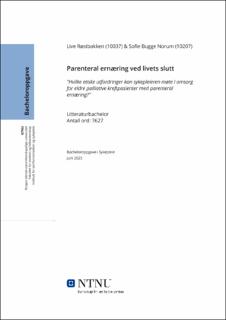| dc.contributor.advisor | Olufsen, Vibeke | |
| dc.contributor.author | Røstbakken, Live | |
| dc.contributor.author | Norum, Sofie Bugge | |
| dc.date.accessioned | 2023-07-18T17:20:09Z | |
| dc.date.available | 2023-07-18T17:20:09Z | |
| dc.date.issued | 2023 | |
| dc.identifier | no.ntnu:inspera:146721298:147643883 | |
| dc.identifier.uri | https://hdl.handle.net/11250/3080007 | |
| dc.description.abstract | Bakgrunn: Mange eldre dør av kreft i Norge i dag. Hos flere med kreft vil parenteral ernæring kunne bli nødvendig på et tidspunkt. Som sykepleier skal man sørge for at pasienter får dekket sitt ernæringsbehov. Når kroppen er døende vil behovet for ernæring endre seg, dette gjelder også behovet for parenteral ernæring.
Hensikt: Hensikten med dette litteraturstudiet er å belyse etiske utfordringer sykepleiere møter i arbeid med eldre palliative kreftpasienter med parenteral ernæring.
Metode: Systematisk litteraturstudium gjennomført mellom mars 2023 og juni 2023. Studien baserer seg på syv forskningsartikler.
Resultat: Funnene viser at pasienter og pårørende knytter parenteral ernæring til håpet om overlevelse, mens sykepleiere betrakter det som en medisinsk behandling. Sykepleiere opplever parenteral ernæring på et sent stadium som uetisk og meningsløst. Relasjonen mellom pasient og sykepleier anses som avgjørende i diskusjoner om å avslutte behandlingen. Manglende informasjon, mangel på behandlingsplan og at sykepleieres mening ikke blir hørt er også påpekt.
Konklusjon: Sykepleieren møter flere etiske utfordringer i arbeid med parenteral ernæring ved livets slutt. Dette er utfordringer der etiske prinsipper kommer i konflikt med hverandre og viktige sykepleierverdier utfordres. Denne oppgaven vil kunne bidra til refleksjon og bevisstgjøring rundt disse.
Nøkkelord: Sykepleie, parenteral ernæring, palliasjon, kreft, eldre, etikk | |
| dc.description.abstract | Background: A large number of aged individuals in Norway die due to cancer. For several cancer patients, parenteral nutrition may become necessary at some point. As a nurse, it is important to ensure that patients have their nutritional needs met. However, as the body approaches the end of life, nutritional requirements change, including the need for parenteral nutrition.
Aim: The purpose of this literature study is to illuminate the ethical challenges that nurses encounter in their work with elderly palliative cancer patients receiving parenteral nutrition.
Methode: A systematic literature study conducted between March 2023 and June 2023. This study is based on seven research articles.
Results: The findings indicate that patients and their families associate parenteral nutrition with hopes of survival, while nurses view it as a medical treatment. Nurses perceive parenteral nutrition at a late stage as unethical and meaningless. The patient-nurse relationship is considered crucial in discussions about ending treatment. Lack of information, absence of treatment plans, and disregard for nurses' opinions are also highlighted.
Conclusion: Nurses face various ethical challenges in their work with end-of-life parenteral nutrition. These challenges involve conflicts between ethical principles and the questioning of important nursing values. This study can contribute to reflection and increased awareness regarding these issues.
Keywords: Nursing, parenteral nutrition, palliation, cancer, elderly, ethics. | |
| dc.language | nob | |
| dc.publisher | NTNU | |
| dc.title | Parenteral ernæring ved livets slutt | |
| dc.type | Bachelor thesis | |
